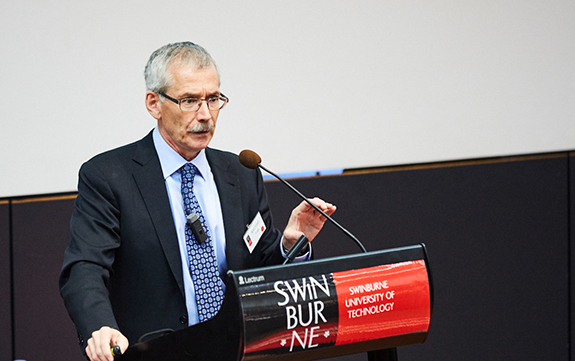Barbara Dicker Oration on memory and dementia

In Summary
With increasing numbers of people entering old age there will be an explosion of people who suffer from Alzheimer’s and other forms of dementia, according to Dr Michael Rugg.
Dr Rugg, a leading international researcher in cognitive neuroscience and human memory, was speaking to an audience of more than 250 people at the fifth annual Barbara Dicker Oration at Swinburne on Thursday 15 September 2016.
He outlined his work aimed at understanding how age-related changes in the brain's structure and function affect cognitive abilities, both in healthy people and those with age-related diseases such as Alzheimer's.
He emphasised that Alzheimer’s is not a part of normal ageing.
Breakthrough in imaging aids brain research
Dr Rugg said the development of imaging methods had enabled researchers to image the build-up of two substances associated with Alzheimer’s – beta amyloid and tau protein – in living people.
He said the use of functional magnetic resonance imaging (fMRI) 20 years ago had also revolutionised understanding of brain function.
“We can break down the different stages of memory and what goes on in the brain when people are learning information as opposed to when they’re retrieving information.”
Dr Rugg said age-related differences in memory performance appear largely to reflect differences in brain function during encoding – the first step in creating a memory.
He said determining which of these differences in brain function are part of healthy ageing, and which might be early indicators of age-related cognitive impairment could only be answered by longitudinal studies.
During his week-long visit, Dr Rugg also toured Swinburne’s neuroimaging facilities, participated in a MEG /EEG student workshop, and took part in a Cognitive Neuroscience Symposium for Swinburne researchers.
Dementia research at Swinburne
In the field of neurosciences, Swinburne has achieved an ERA (Excellence in Research Australia) ranking of 5 - well above world standard. Swinburne’s MRI and MEG neuro-imaging facilities are world class.
There are expansive efforts to understand, prevent, treat and find a cure for dementia across the world and Swinburne is a part of these efforts.
Swinburne Professor Saulius Juodkazis, has developed nanotextured surface technology being used in proof of principle studies to look for biomarkers associated with Alzheimer’s disease.
Another study involving our researchers found that maintaining a healthy heart may help protect the brain from dementia, stroke and cognitive decline.
Brain Sciences Research Showcase
Preceding the oration three researchers from Swinburne’s Brain and Psychological Sciences Research Centre presented a summary of their work on bipolar disorders, an app to promote social reconnection in early psychosis, and brain activity variation through the day.
Barbara Dicker Brain Sciences Foundation
The Barbara Dicker Brain Sciences Foundation was established by Mr Ian Dicker AM and his family in 2012, in honour of his late wife, Barbara Dicker. The foundation aims to contribute to the wellbeing of individuals and communities by supporting research in the areas of dementia, depression and sleep disorders.

